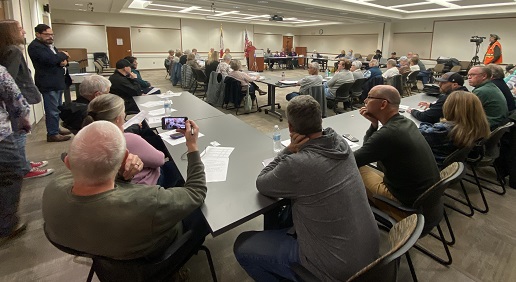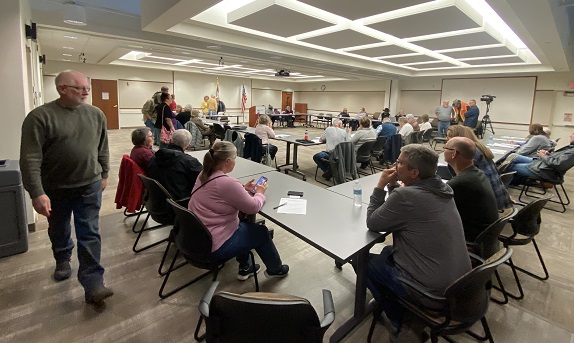Pottawattamie County Town Halls on Federal Covid Recovery Funding Wrap Up with Meeting in Council Bluffs
May 7th, 2022 by Ric Hanson
(Council Bluffs, Iowa) – On Wednesday evening, the community group, United Today, Stronger Tomorrow – a grassroots of coalition of labor, faith, service, and community organizations working to ensure an equitable and prosperous recovery from the pandemic in Iowa, held its final town hall meeting in Council Bluffs to lift up country residents priorities on how federal Covid recovery funding provided by the American Rescue Plan should be prioritized by the county. Fifty five residents showed up for the meeting, in which Supervisors Brian Shea and Justin Schultz also attended to hear what local residents want federal Covid funding to be used for.
Geri Frederiksen, a coalition leader and member of the Concerned Citizens of Pottawattamie County, says, “The Council Bluffs town hall, the last of our three county events, was a huge success! A diverse group of Pottawattamie County citizens shared their stories and suggestions for the allocation of the second round of ARPA funding. I was pleased to see two Supervisors attend and listen to how their fellow citizens have been affected by Covid. This is truly the power of community!” Local business owner and rural resident, Shawna Anderson, noted, “I am excited about the great work we have done to get community input. Amazing ideas come from organic conversation, and the citizens of Pottawattamie County have brought up
important needs. I know not every need can be met with these once-in-a-lifetime dollars, but I’m hoping that once we present it to the Board, we can help influence a project that will meet most of the needs of the county.”

Story and photos submitted by Dave Bushaw
 This town hall was the last of three public meetings the group held to make sure citizens’ voices were heard as well as to educate residents about the funds that were available to communities – but this is not the end of United Today, Stronger Tomorrow’s work in the region. In addition, the group has been collecting survey data, hosting zoom meetings, doing in-person canvassing, and one on one conversations to help create opportunities for local residents to share their priorities for how the money should be spent. These outreach efforts will help to inform what top-line priorities are from the community. After reviewing the data, UTST will not just be sharing the data results, but using their broad and diverse coalitions’ collective resources to formulate a proposal to present to the Board of Supervisors.
This town hall was the last of three public meetings the group held to make sure citizens’ voices were heard as well as to educate residents about the funds that were available to communities – but this is not the end of United Today, Stronger Tomorrow’s work in the region. In addition, the group has been collecting survey data, hosting zoom meetings, doing in-person canvassing, and one on one conversations to help create opportunities for local residents to share their priorities for how the money should be spent. These outreach efforts will help to inform what top-line priorities are from the community. After reviewing the data, UTST will not just be sharing the data results, but using their broad and diverse coalitions’ collective resources to formulate a proposal to present to the Board of Supervisors.
According to Jen Pellant, Executive Director of the Western Iowa Labor Federation AFL-CIO, “Our work is not done. We are going to use all of the input and data we’ve collected to put together a proposal for how the next round of ARPA funds will be spent – one that will represent the needs of the community as a whole rather than just a few special interests.” The American Rescue Plan was passed just over a year ago by Congress and signed into law by the President to address the impacts of Covid 19 on states and local economies and communities. Iowa has received billions in federal aid at both the state and local level, including a total of ~$18 million for Pottawattamie County.
In the rural communities of Oakland and Avoca, town halls held in the previous two weeks drew close to 60 participants between them. In those meetings, healthcare infrastructure, specifically a healthcare clinic in a rural part of the country and/or a mobile healthcare van, and affordable housing for country residents were identified as top needs with the federal funding.





